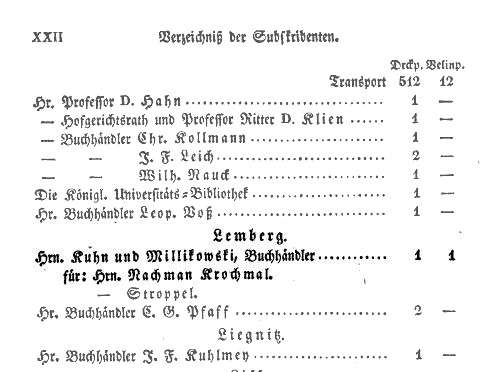
This is from Jay M. Harris's Nachman Krochmal: Guiding the Perplexed of the Modern Age. For those of us who do not remember the 1960 election in which dead people are alleged to have voted for JFK, the reference to Richard Daley is explained here.
As you can see, Harris is discussing when Mendel Lefin of Satanow died. It's interesting that when Harris wrote this (published in 1991, but probably more or less as its written in his 1985 dissertation) 1819 was considered the more commonly accepted date. It seems that today 1826 is already accepted. It's interesting that Nancy Sinkoff does not discuss the dispute over the date in her dissertation (which even includes the 1826 date in the title), but she inadvertently gives even better evidence than that given here; on page 177 she cites Lefin's journal (which is in the JNUL in the Joseph Perl Archive). On the front page Lefin noted that a friend borrowed a book from him on 3 Av 5586 (1826).
The earlier sources obviously hadn't seen this journal, so they can be forgiven for making deductions to show when he died. 1819 was given in the Jewish Encyclopedia. While I don't know why that was the commonly accepted year of death, the reference here to Gelber is to the 6th volume of ערים ואמהות בישראל, the history of the Jews of Brody 1584-1943, by N.M. Gelber. In the chapter השכלה ותרבות he gives 1826 as the date. In the humorous footnote above, Harris notes that Lefin's name appears on the subscriber list to Yitzchak Baer Levinsohn's תעודה בישראל, as indeed it does, and therefore he was alive after 1819:

Interestingly, in the 1855 second edition of תעודה בישראל Levinsohn printed the following amazing note:

He writes that when he approached the Chief Rabbi of Vilna, R. Abele (1764-1836) for an approbation―the book contains three haskamos; from R. Abele, from R. Yakobke Landau, son of the Noda Beyehuda, and from R. Shlomo Yehuda Rapoport; after he signed, he was asked what the book was like; what's good and what's not good about it? And R. Abele answered: "There is no flaw in this book, save one: that our master Rabbi Elijah Chassid of Vilna didn't write it."
I'm tempted to say you can't make this up, but since that's obviously not true, I'll say something more conservative, which is that even if this is made up―and we don't know that it is―at least it had to make a modicum of sense.
Also, since this post is at least somewhat related to Nachman Krochmal, below is his own name on the subscription list to a volume of Hegel's Werke from 1832:






Dr. Harris likes those little throw away references. There is a line in "How Do We Know This" which says something like, "Uriel De Costa was no more surprised to find Rabbinic Judaism in Amsterdam than Captain Renault was to find gambling in Rick's American Cafe..." Not an exact quote, but that's the sense of it.
ReplyDeleteThe quote is:
ReplyDelete"It is now quite clear that Da Costa knew perfectly well that "modern" Judaism entailed practices that went beyond the letter of the biblical text before he arrived in Amsterdam. He was thus no more shocked to find rabbinic (i.e., extrabiblical) practices going on in Amsterdam than Captain Renault was to discover gambling going on Rick's Casablanca Cafe."